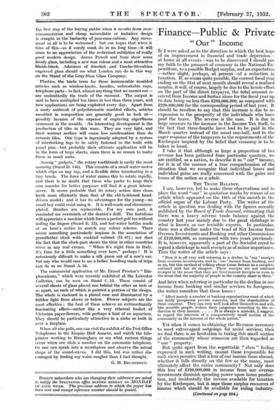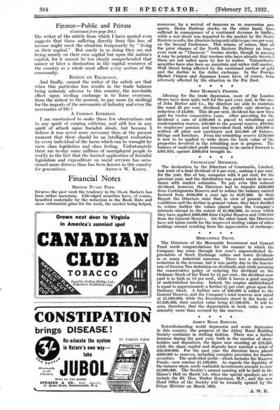Finance—Public & Private
" Our " Income
IF I were asked as to the direction in which the best hope of an improvement in financial and trade depression— at home at all events—was to be discovered I should pin my faith to the prospect of economy in the National Ex- penditure, to a possible Budget surplus, and an expectation —rather slight, perhaps, at present—of a reduction in taxation. If, as seems quite possible, the current fiscal year ending on the 31st of next month should reveal a realized surplus, it will, of course, largely be due to the heroic effort on the part of the direct taxpayer, the total amount re- ceived from Income and Surtax alone for the fiscal year up to date being no less than £282,000,000, as compared with £226,000,000 for the corresponding period of last year. It should be needless to say that this increase is due to no expansion in the prosperity of the individuals who have paid the taxes. The reverse is the case. It is due in large measure to the increase in the Income Tax itself, to the fact that three-fourths have had to be paid in the . March quarter instead of the usual one-half, and to the eager response of the taxpayers to the requirements of the Exchequer inspired by the belief that economy is to be taken in hand.
I take it that although so large a proportion of tax revenue has been gathered from particular quarters, we are entitled, as a nation, to describe it as " our " income, for it is of the essence of a true comprehension of the situation that we recognize that individual losses and individual gains are really concerned with the gains and losses of the nation as a whole.
THE TRADE BALANCE.
I am, however, led to make these observations and to place the word "our" in quotation marks by reason of an article which appeared on the 18th of this month in the official organ of the Labour Party. The writer of the article in question was dealing- with the figures recently published by the Board of Trade Journal, estimating that there was a heavy adverse trade balance against the country last year mainly due to the great shrinkage in what is known as our invisible exports. In particular, there was a decline under the head of Net Income from Oversea Investments and Banking and other Commissions of 1120,000,000, as compared with two years previously. It is, however, apparently a part of the Socialist creed to regard a shrinkage in such receipts as of minor importance. Thus the writer of the article says : "Now it is all very well referring to a decline in-' our' receipts from overseas investments, and in our' income from banking, and so on, but this method of talking-about-Great Britain as a complete national unit has its clingers. These receipts are not national receipts in the sense that they are Government receipts or even in the sense that the majority of people in the country share in them."
And later when referring in particular to the decline in our income from banking and similar services to foreigners, the writer considers that these losses :
" Affect mainly a number of banking organizations most of which are fairly prosperous private concerns, .and the shareholders of these concerns. They can very well look after themselves and will, like sensible people, reduce their outgoings according to the re- duction in their income... It is always a mistake, I suggest, to regard the interests of a comparatively small section of the community as the interest of the whole nation."
Yet when .it comes to obtaining. the Revenue necessary to meet extravagant outgoings for social services, then we find there is no hesitation m taxing this small section of the community whose resources are -then regarded as " our " property.
But quite apart from the regrettable " class " feeling expressed in such writing, cannot those responsible for such views perceive that a loss of our income from abroad, whether it falls directly 'on the few or the many, must ultimately affect the entire community? Not only does this loss of L120,00(000 in income from our °versee investments diminish spending power upon home produc- tion, , and incidentally the income available for taxation by the Exehequer, - but it saps -those- surplus- resources of income which should be available for aiding industry.
(Continued on page 4044
Finance—Public and Private (Continued from:page 302.) The writer of the, article from Which I have quoted even suggests that those suffering directly from this loss of income Might meet the situation temporarily by " living on their capital." But surely in so doing they are not living merely on their own capital but upon the nation's capital, for it cannot be too clearly comprehended that sooner or later a diminution in the capital resources of the country as a whole must affect every section of the community.
EFFECT ON EXCHANGE.
And finally, cannot the writer of the article see that when this particular loss results in the trade balance 'being seriously adverse to this country, the inevitable effect upon sterling exchange is to force everyone, from the richest to the poorest, to pay more (in sterling) for the imports of the necessaries of industry and even the necessaries of life ?
A COltAION INTEREST.
I am constrained to make these few observations not in any spirit of carping criticism, and still less in any spirit of attack upon Socialist ideals, but because I believe it was never more necessary than at the present moment that there should be an intelligent realization by every individual of the harm which can be -wrought by ,mere class legislation and class feeling. Unfortunately there are to-day some millions of unemployed people to 'testify to the fact that the hurried application of SOcialist legislation and expenditure on social services has occa- sioned.more distress than has been known in this country



































 Previous page
Previous page